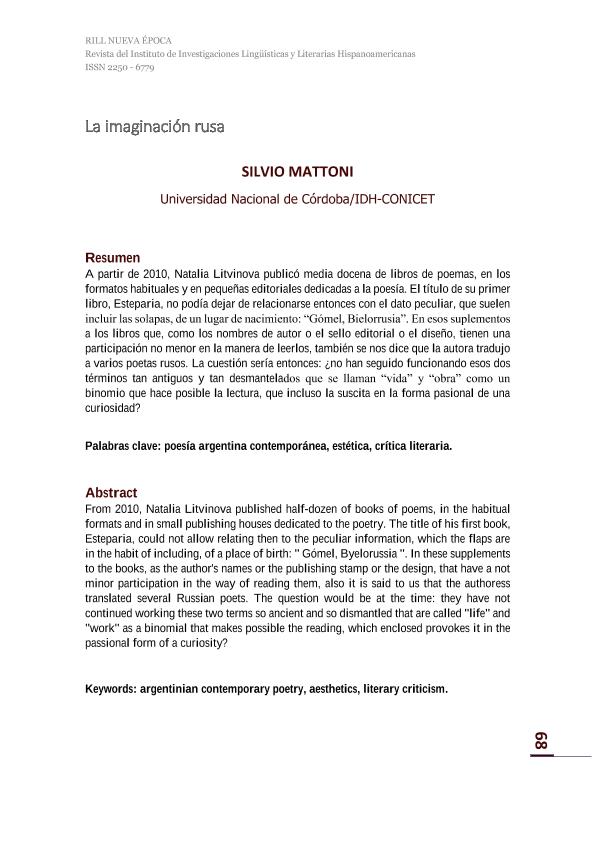Mostrar el registro sencillo del ítem
dc.contributor.author
Mattoni, Silvio Luis

dc.date.available
2019-12-06T17:43:15Z
dc.date.issued
2018-08
dc.identifier.citation
Mattoni, Silvio Luis; La imaginación rusa; Universidad Nacional de Tucumán. Facultad de Filosofía y Letras; Revista del Instituto de Investigaciones Linguísticas y Literarias Hispanoamericanas; 22; 8-2018; 68-77
dc.identifier.issn
2250-6799
dc.identifier.uri
http://hdl.handle.net/11336/91651
dc.description.abstract
A partir de 2010, Natalia Litvinova publicó media docena de libros de poemas, en los formatos habituales y en pequeñas editoriales dedicadas a la poesía. El título de su primer libro, Esteparia, no podía dejar de relacionarse entonces con el dato peculiar, que suelen incluir las solapas, de un lugar de nacimiento: "Gómel, Bielorrusia". En esos suplementos a los libros que, como los nombres de autor o el sello editorial o el diseño, tienen una participación no menor en la manera de leerlos, también se nos dice que la autora tradujo a varios poetas rusos. La cuestión sería entonces: ¿no han seguido funcionando esos dos términos tan antiguos y tan desmantelados que se llaman "vida" y "obra" como un binomio que hace posible la lectura, que incluso la suscita en la forma pasional de una curiosidad?.
dc.description.abstract
From 2010, Natalia Litvinova published half-dozen of books of poems, in the habitual formats and in small publishing houses dedicated to the poetry. The title of his first book, Esteparia, could not allow relating then to the peculiar information, which the flaps are in the habit of including, of a place of birth: " Gómel, Byelorussia ". In these supplements to the books, as the author's names or the publishing stamp or the design, that have a not minor participation in the way of reading them, also it is said to us that the authoress translated several Russian poets. The question would be at the time: they have not continued working these two terms so ancient and so dismantled that are called "life" and "work" as a binomial that makes possible the reading, which enclosed provokes it in the passional form of a curiosity?.
dc.format
application/pdf
dc.language.iso
spa
dc.publisher
Universidad Nacional de Tucumán. Facultad de Filosofía y Letras

dc.rights
info:eu-repo/semantics/openAccess
dc.rights.uri
https://creativecommons.org/licenses/by-nc-sa/2.5/ar/
dc.subject
POESÍA ARGENTINA CONTEMPORÁNEA
dc.subject
ESTÉTICA
dc.subject
CRÍTICA LITERARIA
dc.subject
POÉTICA
dc.subject.classification
Literaturas Específicas

dc.subject.classification
Lengua y Literatura

dc.subject.classification
HUMANIDADES

dc.title
La imaginación rusa
dc.type
info:eu-repo/semantics/article
dc.type
info:ar-repo/semantics/artículo
dc.type
info:eu-repo/semantics/publishedVersion
dc.date.updated
2019-10-23T15:09:25Z
dc.journal.number
22
dc.journal.pagination
68-77
dc.journal.pais
Argentina

dc.journal.ciudad
Tucumán
dc.description.fil
Fil: Mattoni, Silvio Luis. Consejo Nacional de Investigaciones Científicas y Técnicas. Centro Científico Tecnológico Conicet - Córdoba. Instituto de Humanidades. Universidad Nacional de Córdoba. Instituto de Humanidades; Argentina
dc.journal.title
Revista del Instituto de Investigaciones Linguísticas y Literarias Hispanoamericanas
Archivos asociados
